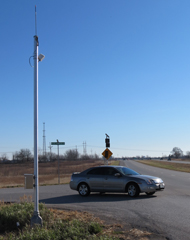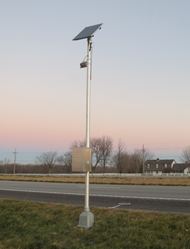
Video
Español
Get a Quote
Systems / Products
Applications
Data Sheets
Product Line
Articles / References
News Releases
Specialty Systems
Design Guides / Get Quote
AC-Powered Controls New
Area & In-Roadway Lighting
Fire Chiefs: Firefighting
High Water Sensor
Industrial
Police Chiefs
Public Works
Roadway Sensor Power
Safe Routes to School
Traffic Calming
Unusual Projects
Customer Service
Contact Us
FAQs
Send Us Your Requirements
Wireless Traffic Control Solutions: A Primer
About STC
Trade Shows & Events
Eco-Opportunity
Bio - Joe Wise
Media Fact Sheet
Links
FIRST
EVIT
Solar Electric Basics
Traffic Systems & Technology
Trafficalm Systems
Magnaray International
BarcodesInc/Electronics
| STC In The News
STC and TCC safety project for MODOT
Highway 50 has posted speed limits of 65mph just east of town; several side roads allow local traffic access. Previously, the intersections did not feature any signals but have now been outfitted with warning beacons. The beacons are placed so they warn traffic on the side roads of higher speed traffic approaching. Each side road access point has an advance detection station and a flashing beacon. Traffic Control Corporation and Solar Traffic Controls teamed up with a MODOT engineering team led by Dave MacDonald (RET), to create a solution for the project. Using RTMS and STC Flashing Beacons
The fourth location did have AC power but was about 600 feet away across an open field. The solar-powered detection points included a self-contained solar power system designed to power the equipment year round based on the solar data for the location, the equipment load and the projected duty cycle for all the equipment. A user interface allows the setting of the run time for each road's flashing beacon as the distances from detector to flashing beacon varied at each of the four locations. Each detection station also included a self-test function to allow DOT personnel to test the equipment without the sensor present. With the availability of AC at one detection point, STC designed an AC equivalent to the solar-powered detection stations. The two systems function similarly except for the incoming power source.
Please note: This project was started to minimize the incidence of accidents from traffic entering the highway from side roads. An accident in the recent past led to a need to address the issue. By warning drivers on the side roads of the approaching high speed traffic via the flashers it is hoped fewer accidents will occur. For more information please contact Ken Kohl at the TCC St. Louis area office via the company's main website at http://www.trafficcontrolcorp.com Celebrating our 12th year designing and manufacturing solar-powered traffic control systems. For more information on STC's products and services, please stay here on our website or send an email to info@solar-traffic-controls.com or call 480.449.0222.
|
CAGE Code 4GN91
| Site by Artique Design Works | © 2001 - 2026 Solar Traffic Controls, L.L.C. - All Rights Reserved |
 TEMPE, AZ - 05/03/2013 - Missouri DOT (MODOT) is working to improve safety
for motorists along Highway 50 near Lee's Summit, MO. The route consists of
two lanes westbound, two eastbound with a large median between them (about
3-4 lanes wide).
TEMPE, AZ - 05/03/2013 - Missouri DOT (MODOT) is working to improve safety
for motorists along Highway 50 near Lee's Summit, MO. The route consists of
two lanes westbound, two eastbound with a large median between them (about
3-4 lanes wide).
 There is an associated flashing beacon for each detection station. Three of
the four flashing beacons are solar-powered; the fourth is AC-powered from a
nearby service point. All the solar-powered beacons use the STC 12-inch
amber DC lamp which has an optical output greater than 990 Cd on center (ITE
is 910) to ensure an adequate optical output. Both flashing beacon stations
and the detector stations use a modified version of the
There is an associated flashing beacon for each detection station. Three of
the four flashing beacons are solar-powered; the fourth is AC-powered from a
nearby service point. All the solar-powered beacons use the STC 12-inch
amber DC lamp which has an optical output greater than 990 Cd on center (ITE
is 910) to ensure an adequate optical output. Both flashing beacon stations
and the detector stations use a modified version of the